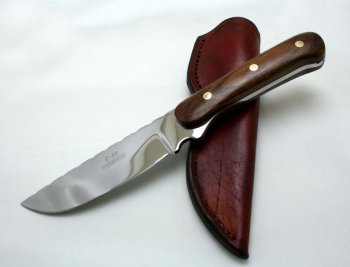curtisk
Well-Known Member
I am fully confident that this topic will stir up the proverbial hornet’s nest, but hey, what the heck.
I have read many posts from brand-new makers about the possibility of using mower blades as knives. Some people think it is a good idea, but the vast majority says “nay”; vehemently I might add. That being said, I have always been one to take the narrow path (my Momma said I was hard headed) and had to give it a shot. Gentlemen, I must say, I have not been disappointed, not in the least.
It seems that industrial/commercial mower blade steel runs the gamut from 10b38 to a 5160. I have used 5160 for knives and hawk heads and it is a good all around steel. Now, before the “nay” crowd gets out the rope for yours truly, I made a knife out of the former. The edge holding attributes are amazing for such a low carbon content steel. I made 100 cuts through 3/8” grass rope and it would still shave; not just pull hair, but shave like PawPaw’s razor. I really think it will do much more than a 100 cuts but I ran out of rope.
I did some more research on the topic and it seems that the boron added to the steel adds to the “hardenability” of the metal. It has been rated at 48 Rockwell C but on average will yield a 40-45. Now most blade manufacturers utilize Austempering but I used the traditional Austenitizing, quenching (canola oil), and three temper cycles at 450 degrees. The bottom line is it works.
Anyways, I thought I would share my findings. I will submit to whatever punishment (other than drawing and quartering, and of course keel-hauling) my fellow knifemakers conclude is necessary to cure me of my heretical ways, should it be deemed necessary that is.
Regards,
CurtisK
I have read many posts from brand-new makers about the possibility of using mower blades as knives. Some people think it is a good idea, but the vast majority says “nay”; vehemently I might add. That being said, I have always been one to take the narrow path (my Momma said I was hard headed) and had to give it a shot. Gentlemen, I must say, I have not been disappointed, not in the least.
It seems that industrial/commercial mower blade steel runs the gamut from 10b38 to a 5160. I have used 5160 for knives and hawk heads and it is a good all around steel. Now, before the “nay” crowd gets out the rope for yours truly, I made a knife out of the former. The edge holding attributes are amazing for such a low carbon content steel. I made 100 cuts through 3/8” grass rope and it would still shave; not just pull hair, but shave like PawPaw’s razor. I really think it will do much more than a 100 cuts but I ran out of rope.
I did some more research on the topic and it seems that the boron added to the steel adds to the “hardenability” of the metal. It has been rated at 48 Rockwell C but on average will yield a 40-45. Now most blade manufacturers utilize Austempering but I used the traditional Austenitizing, quenching (canola oil), and three temper cycles at 450 degrees. The bottom line is it works.
Anyways, I thought I would share my findings. I will submit to whatever punishment (other than drawing and quartering, and of course keel-hauling) my fellow knifemakers conclude is necessary to cure me of my heretical ways, should it be deemed necessary that is.
Regards,
CurtisK

